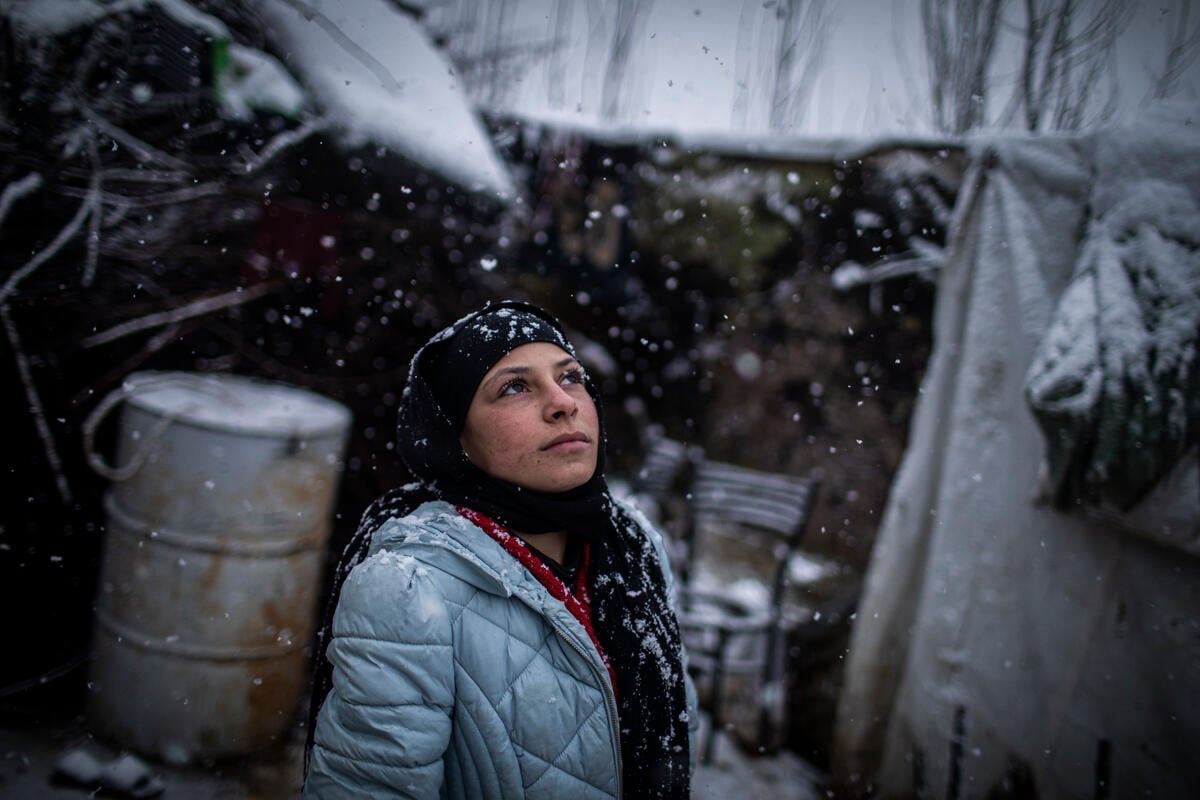A decade on, Syrian refugees mired in 'silent war' for survival
In the single damp room where her family of six all sleep together – the air heavy with the smell of mould that stains the walls and furniture – 35-year-old Syrian refugee Hala describes the downward spiral their lives have taken since fleeing the conflict in their home country and coming to Lebanon 10 years ago.
“Our main objective was to get out of the war with our lives,” Hala said of their escape from their hometown of Hama in 2011. “[In Lebanon] there was a little bit of serenity […]. Our kids were still going to school, they were learning, they would become something in the future and make their mother and father proud.”
But as the crisis next door in Syria ground on year after year, their resources became increasingly stretched and the debts began to pile up. Hala’s three older children had to drop out of school, and her eldest son Amer, 16, started working to supplement her husband’s low-income daily labour.
Hala’s situation has sadly become the norm for families caught up in the world’s largest refugee crisis.
As the Syrian conflict enters its second decade, instead of getting easier, daily life for the 5.6 million refugees living in neighbouring countries in the region is tougher than ever.
Poverty and food insecurity are on the rise, school enrollment and access to health care are shrinking, and the COVID-19 pandemic has wiped out much of the informal work that refugees rely on.
“One thing after another, everything that I have done […] in the last six to seven years is gone, nothing left,” Hala’s husband Yasser said. “The situation is very hard […]; it got inside of us, the children were affected and depressed.”
“I’m 16 years old – at this age I should be living the best days of my childhood,” their son Amer added. “Dropping out of school made me feel like I’m unwanted in this life. I used to work 12 hours a day, standing on my feet while I should be at school studying.”
Lebanon’s financial crisis has sent the currency plummeting and prices of everyday basics shooting up. Combined with the devastating economic effects of the COVID-19 pandemic, this increased the share of Syrian refugees in the country living under the extreme poverty line to almost 90 per cent by the end of 2020.
"It's like we're living in a daily war."
Both Amer and his father Yasser lost their jobs during the pandemic, leaving the family struggling to put food on the table and fearing eviction from the damp apartment that has left two of the children suffering from severe asthma.
The family’s mental health has also suffered as a result of the situation, with Hala often spending days unable to get out of bed, and both her and her son Amer experiencing suicidal thoughts.
It is part of a wider pattern of increasing mental health issues among Syrian refugees triggered by prolonged displacement, the pandemic and declining economic conditions. In late 2020, a call centre in Lebanon run by UNHCR, the UN Refugee Agency, reported an increase in calls from refugees thinking about suicide and self-harm.
Yasser summed up their situation, saying that despite escaping the conflict in Syria: “It’s like we’re living a daily war; a silent, domestic war.”
Across the region, it is a similar picture for other Syrians that have fled the conflict over the past decade. Originally from Homs, 45-year-old Ahmad left the country in late 2011 and went to Libya, where he hoped the relatively lower number of Syrian refugees would offer him more chance of finding work as an experienced tiler.
“At first when we came here, things were okay. But then the situation changed. We witnessed war in Syria, then we saw war again here in Libya,” said Ahmad, referring to the renewed violence and instability that erupted in 2014, following the country’s first civil war in 2011.
“2020 was the hardest year for me. Not only was the fighting still going on, but the coronavirus pandemic started,” said Ahmad, who lives with his wife and five children in Tripoli. “My biggest worry is how I can make a living nowadays. Just a few years ago it was very easy to find work, there were many jobs, and I could find work every day. That’s not the case now.”
Their precarious situation in Libya has led Ahmad to consider uprooting the family once more, but he and his wife Ghadir said they could not contemplate returning to Syria at present.
The protracted crisis has taken a disproportionate toll on vulnerable groups such as children – who make up almost half of all Syrian refugees – older people, those living with disabilities and single women and mothers.
Asma*, 40, is originally from Raqqa in Syria, but in 2015 fled with her three children to Izmir in western Turkey, which hosts the largest number of Syrian refugees globally at more than 3.6 million.
“I left Syria because I lost my husband during the war – he was killed during the bombing,” Asma explained. “When I came to Turkey, I borrowed money from people and started working. Also, some people helped me when I first came here. I started receiving financial assistance. My children started going to school. We felt safer here.”
But after several years of being able to support herself and despite finding safety, Asma’s declining health and difficulty accessing medical care due to the language barrier means she is unable to continue her work in a garment factory and is struggling to cover her costs. Only her middle son Ahmed, 13, is still going to school.
“The biggest problem for me now is how to pay the rent and the bills,” she said. “For food, thank God we have people around who help us. But for the rent and the bills, it’s expensive and we need to pay for the electricity, water and internet. Especially for my son Ahmed, who has online schooling, we need internet.”
Renewed and long-term financial support from the international community is required to mitigate the economic impacts of COVID-19 and halt the decline in living standards, Last year, only around half of the total funding requested by aid organizations to meet the growing needs of Syrian refugees and their hosts was delivered, the lowest level since 2015.
With no end to the crisis in sight, there is a risk that dwindling international support and deteriorating economic conditions for millions of refugees and vulnerable members of the local communities that host them could unravel previous progress and reduce access to education and livelihoods, threatening the futures of an entire generation. Many already feel it is too late.
Khalil, 18, came to Jordan with his family from rural Aleppo in 2013 and settled in the capital Amman. At first, the bright and talkative youngster was able to continue his education at a local school. But aged just 13, he had to drop out and start working to help support his large family.
"There are some kids who had to give up their dreams."
“I used to want to be a doctor back in Syria, but becoming a refugee changed that,” Khalil said. “There are some kids who had to give up their dreams.”
He now works six days a week as a mechanic, earning 7 Jordanian Dinars (US$10) a day regardless of the hours, which are often long. “It’s exhausting,” Khalil said.
Like millions of other Syrian refugees still scattered across the region, despite escaping the country’s conflict Khalil has seen his prospects evaporate. As the crisis grinds on after 10 years, he now contemplates the future with a sense of resignation.
“Life goes on, anyway,” he said. “That is my fate; I have to accept it and live with it.”
*Name changed for protection reasons.
Reporting by Dalal Harb in Beirut, Caroline Gluck in Tripoli, Cansin Argun in Ankara, and Nida Yassin in Amman. Writing by Charlie Dunmore.














